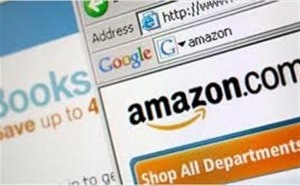Soooooo … state governments want a piece of that sweet, sweet online sales dollars.
That’s not the only reason that Senator Mike Enzi (R-WY) introduced the Marketplace Fairness Act, of course. But I’d bet it’s the largest one, no matter what Enzi says. It’s not been fun being state and local government since the collapse. Tax revenues are down while committed expenditures weren’t declining commensurately.
The MFA gives the states and other local governments the explicit power to collect sales tax revenue from online sales, something that’s been a grey area in many locations. Estimates are that it could lead to billions annually – and likely more over time.
Of course, this also has something to do with the lobbying power of large brick and mortar legislation. The fact that online stores could undercut the cost of items even though their cost of goods was the same as that of brick and mortar stores has long been seen – not just by the B-n-M companies – as an unfair advantage. Still, perhaps that’s done with now.
Raising cost is better for everyone! Yay!
OK, technically the bill won’t raise taxes on purchases. It’ll just make enforceable the existing taxes that aren’t being collected. Online shoppers are SUPPOSED to record their sales tax due and pay it themselves each year. Unsurprisingly, I know no one who does that.
Still, if passed, there will clearly be winners and losers. The estimate for U.S. online sales in 2011 was $255.6 billion. If a 5% sales tax rate is applied to that, we see an expected tax cost of $12.78 billion. That’s a significant cost increase for online sales and one I don’t expect to be absorbed by online sales.

Another one that actively is worried is eBay Inc (NASDAQ:EBAY). I know this because I became alerted to the bill when eBay’s government relations group emailed me asking if I could get behind blocking the bill. The company is arguing that an Internet Sales Tax is bad for small businesses. It’s … nice … that they’re looking out for the little guy. Hmm.
More likely, they’re looking out for themselves. Like Amazon.com, Inc. (NASDAQ:AMZN), they don’t want those small businesses to go away and lessen their client base. Unlike Amazon, eBay Inc (NASDAQ:EBAY) could afford to absorb the loss given its 18.54% net margin in 2012. That, combined with steady share growth tells me that eBay is worried, but not frightened.
Why is this company smiling?
One of the things the act will do is lessen the impact of ‘showrooming’. Creating tax equity will lessen the amount of customers coming to stores to try out a product and ordering it online. Best Buy Co., Inc. (NYSE:BBY), in particular, has complained about this practice in the past and has taken steps to make purchasing in-store more attractive.
But, a hit to the opposition is just as good as a boost for Best Buy Co., Inc. (NYSE:BBY). The firm is losing money, and can’t yet be seen as a strong buy, but even a small turnaround could make it worth having. After Q1 of 2012, it’s working at a -0.92% loss while the stock is growing. Someone out there thinks there’s a turnaround coming.
Another firm that’s complained about showrooming is Target Corporation (NYSE:TGT). While there was never any confirmation from the company, showrooming was the rumored reason the store stopped carrying Amazon.com, Inc. (NASDAQ:AMZN)’s Kindle. There’s a lot of positive things about Target, including a solid dividend yield of 2.09%, a net margin of 4.23% for last quarter, and a share growth of 20.53% over the last twelve months. Target Corporation (NYSE:TGT) is worth having and the MFA should make it marginally more attractive if it passes.
Wal-Mart Stores, Inc. (NYSE:WMT), the largest retail chain in the world, has also tried to end showrooming by offering online shoppers free pick up in its stores, reasoning that if they’re there, they’ll pick up more stuff. Still, Wal-Mart Stores, Inc. (NYSE:WMT) is a near twin to Target in the investing world. Profit of 4.59% in Q1, dividend of 2.4%, and share growth of 25.36%. It’s a bit more attractive that Target and will likely reap a bit more gain from the MFA.
So will it pass?
If the Senate can pass the Marketplace Fairness Act, it’ll be because the retail lobbyists outpower the tech lobbyists. Now, historically, the tech sector has been weak in its lobbying efforts. But that doesn’t mean they can’t bring pressure to bear when there’s a real threat in front of them. Still, I think it’ll pass the senate and likely the house because there will also be pressure from the state parties on their congressional delegations to bring that sweet revenue home.
The article Wounding Online Shopping for Taxes originally appeared on Fool.com and is written by Nate Wooley.
Copyright © 1995 – 2013 The Motley Fool, LLC. All rights reserved. The Motley Fool has a disclosure policy.

